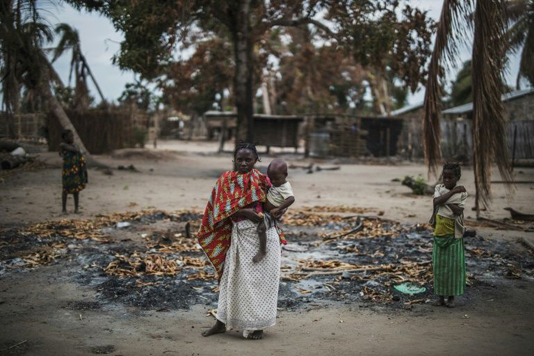MACOMIA, Mozambique, Sept 6, 2019 (BSS/AFP) – Aldeia da Paz was once a
sleepy place. Farmers went about their daily lives, tending to meagre crops
along the road linking Mozambique to its northern border with Tanzania.
Everything changed after nightfall on August 1st.
“They arrived around seven o’clock in the evening,” said Lucas Saimone, one
of the village chiefs. “When they started shooting and burning down houses,
the whole population fled into the forest.”
No one was killed, said Saimone, but the entire village was “turned to
ashes.”
That day, the inhabitants of Aldeia da Paz became the latest victims of
unknown Islamist militants sowing death and fear in the north of Mozambique –
– an impoverished coastal country renowned for its pristine beaches and coral
reefs.
Pope Francis is expected to visit on Wednesday, months after the nation was
hit by two devastating cyclones that claimed more than 600 lives.
But the northern province of Cabo Delgado is also grappling with a less
visible, more insidious enemy than climate change.
Jihadists have killed at least 300 civilians over the past two years, often
by beheading them. Dozens of villages have been wiped off the map and
thousands of people displaced. Local media reported around 20 deaths in
August.
Since the attack, Aldeia da Paz has come to a standstill. The villagers are
hungry and terrified.
All that remains are piles of ash and a few daub walls topped with blacked
roof beams.
– ‘Sentenced to die’ –
Zahina Asman sits near a rusty saucepan surrounded by a pile of debris.
“This is all that is left of my house,” said the 60-year old, chewing on a
cassava root.
“They didn’t kill anyone but they burnt all our crops. It makes no
difference because without food we are sentenced to die of hunger.”
Catholic charity Caritas has delivered emergency aid, but chief Saimone
does not consider this “enough”.
“What we need the most is a roof. People are sleeping outside,” he said.
“We also want some soldiers to stay here permanently, like they do in other
villages.”
Military officials were deployed to Cabo Delgado after the first suspected
Islamist attack in October 2017. But today there is barely a checkpoint along
the 400 kilometres of road linking the regional capital Pemba to the border
post town of Mocimboa da Praia. There is only the occasional soldier carrying
an automatic rifle.
Without a shelter and crops to harvest, many villagers have left.
Fransa Abou fled her home in November after it was incinerated by
Islamists. She found refuge 50 kilometres (30 miles) away, in the district of
Macomia, with her husband and four children.
“My house was burnt with everything inside it. I came here to protect my
children,” she said.
– ‘We are hungry’ –
Fransa first stayed in a hut provided by relatives. But the house was
destroyed by Cyclone Kenneth in May, forcing the family to squeeze into a
tiny wooden structure.
“Over there I used to fish and cultivate [crops]. Here I can do nothing to
feed my children. We are hungry,” said Fransa’s husband Ayuba Chacour, 30.
“Those who are attacking us, we don’t even know what they want!”
Less than 20 percent of Mozambique’s 29.5 million inhabitants are Muslim.
The majority live in Cabo Delgado, and do not understand why they are being
targeted.
Little is known about the attackers, who act under the name of Al-Shabab —
Arabic for “the Youth”. The group was started by young fundamentalists who
returned to the area after attending Koranic schools in Somalia and Tanzania.
Aside from two dubious claims of responsibility by so-called Islamic State
(IS), the group seldom communicates and makes no distinction between
Christians and Muslims.
Experts are baffled. Some have drawn parallels to Boko Haram in
northeastern Nigeria. Others describe a group of political dissidents,
frustrated by poverty and anxious to benefit from the vast natural gas
deposits discovered off Mozambique’s northern coast.
– Lack of action –
“Some of those who were arrested said they were paid to attack… They have
no (religious) conviction,” said Eliane Costa Santana, a Brazilian missionary
who has lived in Mocimboa da Praia for two years.
“But they have succeeded in creating a climate of terror. People are scared
to speak, to meet, to move, they stay holed up in their homes,” she said.
“And the army is not changing anything.”
President Filipe Nyusi has repeatedly pledged to “eradicate” what he refers
to as “criminals” rather than Islamists.
Cabo Delgado’s police spokesman Augusto Guta told AFP the situation was a
“concern” but that measures were being taken “to ensure safety to the
communities”. He added that specific details could not be disclosed for
security reasons.
On the eve of Pope Francis’s scheduled arrival in Maputo, the bishop of
Pemba strongly condemned the government’s passivity in the face of what he
calls Islamist “ghosts”.
“They should tell us who they are, expose them and act to put an end to the
attacks,” said Dom Luiz Fernandes. “It is the poorest who die, those who have
almost nothing, and we cannot accept this.”
The frustration is palpable.
“We live in a state of war,” said one Mocimboa resident. “It is high time
we went back to a regular life.”



